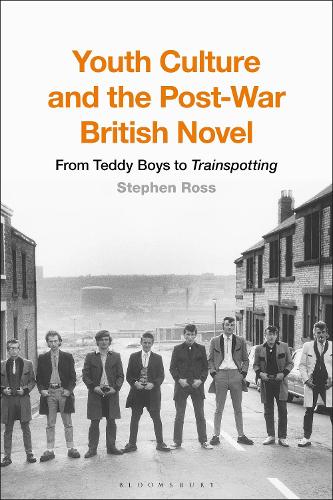
Youth Culture and the Post-War British Novel: From Teddy Boys to Trainspotting
(Paperback)
Available Formats
Publishing Details
Youth Culture and the Post-War British Novel: From Teddy Boys to Trainspotting
By (Author) Professor Stephen Ross
Bloomsbury Publishing PLC
Bloomsbury Academic
13th December 2018
United Kingdom
Classifications
Tertiary Education
Non Fiction
Literary studies: fiction, novelists and prose writers
Popular culture
823/.9109352421
Physical Properties
Paperback
264
Width 154mm, Height 232mm, Spine 10mm
400g
Description
From the Teddy Boys of the post-war decade to the heroin chic of Cool Britannia, the many subcultures of Britains teenagers have often been at the forefront of social change. Youth Culture and the Post-War British Novel is the first book to chart that history through the work of some of the most influential contemporary British writers. In this vivid work of cultural history, Stephen Ross explores: The manic teenage vision of Absolute Beginners The Angry Young Men of Saturday Night and Sunday Morning Skinheads and Burgesss A Clockwork Orange Irony and authenticity in the 1980s from Amis to Kureishi Heroin chic, disaffection and Trainspotting Examining the cultural contexts of some of the most important and popular post-1945 British novels, the book covers such themes as crises of masculinity, multiculturalism and inter-generational conflict, and in doing so casts new light on British writing today.
Reviews
Youth Culture and the Post-War British Novel is a lively contribution to a growing area of postwar and contemporary literary studies. Rosss style is at once accessible and engaging, and his book offers new ways of thinking about the importance of youth culture to a range of novels from the latter half of the twentieth century. * Nick Bentley, Senior Lecturer in English Literature, Keele University, UK *
This is a nimble and user-friendly study tour of British youth culture navigating a series of iconic post-WWII novels. From Ted to Mod, Droog to Punk, Rude Boy to Sick Boy and Renton, Stephen Ross ably takes on All the Young Dudes, providing a highly engaging and well-researched context for reading novels that, in his words, think with and about changing forms of generation, style, class, masculinity, sexuality, and nationality. * Aaron Jaffe, Frances Cushing Ervin Professor of English, Florida State University, USA *
In Stephen Rosss important, compellingly readable account, he shows how fiction not only thinks about youth culture but thinks with it, to address anxieties about authenticity, masculinity, and generational identity. * Leif Sorensen, Associate Professor of English, Colorado State University, USA *
Author Bio
Stephen Ross is Professor of English at the University of Victoria, Canada. He is Past-President of the Modernist Studies Association (2015/16), General Editor of The Routledge Encyclopedia of Modernism Online and co-editor (with Derek Ryan) of The Handbook to the Bloomsbury Group (Bloomsbury, 2018).
